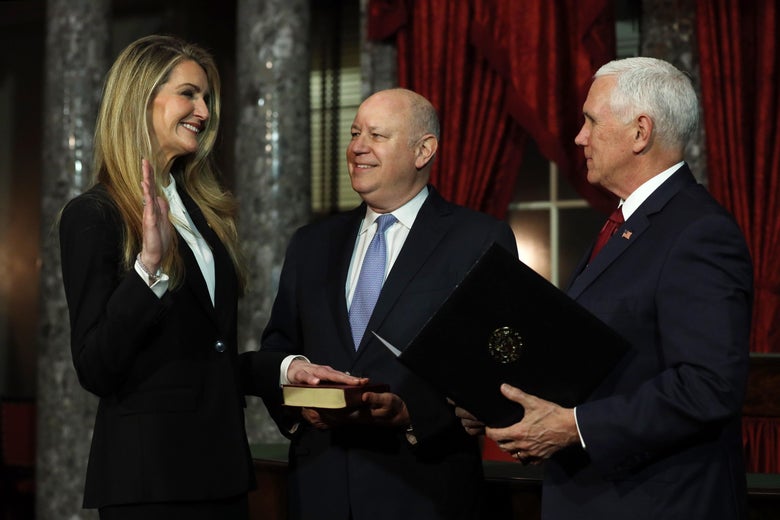
Sen. Kelly Loeffler (R-GA) is sworn in by Vice President Pence on Jan. 6, 2020 as her husband Jeff Sprecher looks on.
Alex Wong/Getty Images
Here comes another round of damaging disclosures about questionable financial dealings of Republican Sen. Kelly Loeffler of Georgia. The Atlanta Journal-Constitution reports that the January appointee to the Senate dumped millions in stock in late February and early March, selling off shares in retail companies, while investing in a manufacturer of coronavirus protective gear. Two weeks ago, the first wave of disclosures about Loeffler’s trades covered the first six weeks of the year, until mid-Feb., created a cloud of suspicion over whether the newly-appointed lawmaker was trading on insider information about the then-undisclosed potential impact of the coronavirus. The latest disclosures to the AJC by the Loeffler campaign, however, provide an updated look at one of the wealthiest senator’s financial transactions up until mid-March.
“The largest transactions—and the most politically problematic—involve $18.7 million in sales of Intercontinental Exchange stock in three separate deals dated Feb. 26 and March 11. Loeffler is a former executive with ICE, and her husband, Jeff Sprecher, is the CEO of the company, which owns the New York Stock Exchange among other financial marketplaces,” the AJC reports. “During the same time period reflected on reports filed late Tuesday, the couple also sold shares in retail stores such as Lululemon and T.J. Maxx and invested in a company that makes COVID-19 protective garments.”
Loeffler has maintained that she and her husband’s portfolio is managed independently by a third party. That seems plausible enough, but did Loeffler pick up the phone at some point? She has said that the trades were executed as part of a long-held investment strategy, but one could reasonably conclude that such a strategy might change in the face of a potential market apocalypse. Loeffler, as a member of the Senate Health Committee, was privately briefed on Jan. 24 by the head of the CDC and now-ubiquitous infectious disease specialist Dr. Anthony Fauci. What might you sell off if you were playing ahead of a pandemic where everyone was shuttered in their homes? Take a look around at what’s open at the moment. You’d probably dump retail and buy digital companies of all sorts. You probably wouldn’t hold onto airlines or anything travel related. You would look to pick up logistics businesses, grocery stores, and anyone making coronavirus-relevant medical equipment. That’s not even a nuanced read of the market; that’s just quick survey of the obvious, what’s available in the neighborhood at the moment.
What did Loeffler and her husband’s investment team do? “Sprecher bought $206,774 in chemical giant DuPont de Nemours in four transactions in late February and early March. DuPont has performed poorly on Wall Street lately, but the company is a major supplier of desperately needed personal protective gear as the global pandemic strains hospital and first responders,” according to the AJC. “At the same time, the couple dumped $70,958 in stock from retail clothier Ross Stores and a similar sale of $27,580 in stock from the TJX Cos., the parent corporation for T.J. Maxx and Marshalls. Sprecher also unloaded stock worth $56,693 in the upscale yoga clothier Lululemon in early March, just after the stock dipped from its all-time high.”
Not all of the transactions reeked of insider knowledge, such as sales of Facebook and the company Docusign, which you might expect to excel during the crisis, but that’s why the Stock Act was signed into law in 2012. It wasn’t just to keep elected officials from profiting from insider information, it was to help eliminate any appearance that they might be doing so, that they might be trading ahead of the market instead of looking out for their constituents best interests.
from Slate Magazine https://ift.tt/3dPCqRU
via IFTTT
沒有留言:
張貼留言